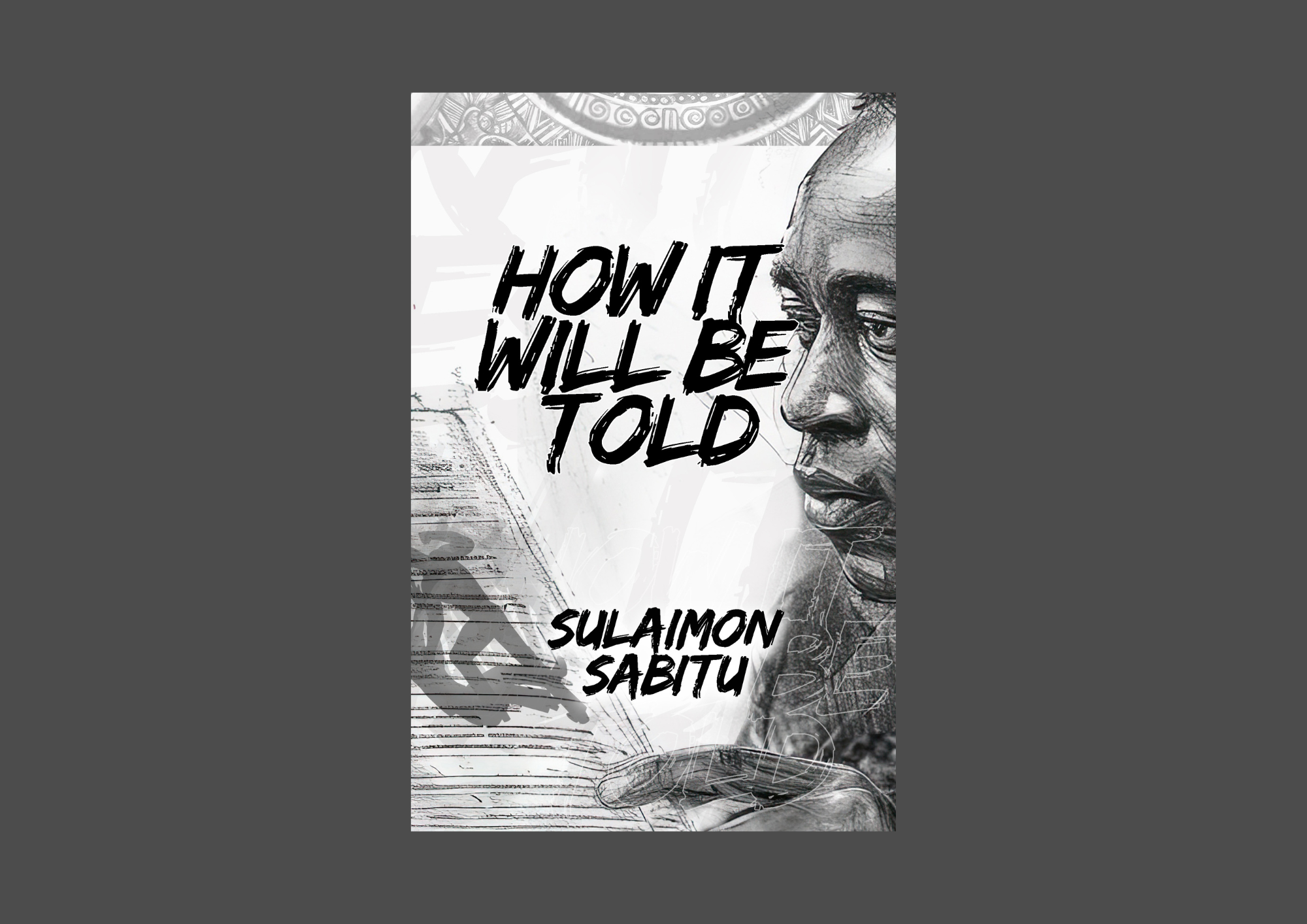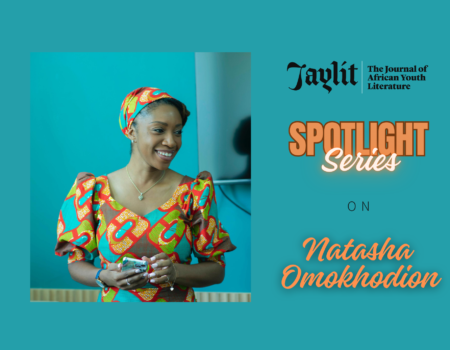Sulaimon Sabitu’s How It Will Be Told is a collection of thirty short evocative poems that invite readers into a lyrical odyssey. In the book, personal reflection, communal memory, and cultural belonging intertwine in tenderly haunting verses. As part of the African and Black Creatives for Development (ABC4D) Series, the collection explores the poet’s inner world, which builds on a resonant dialogue with the broader African experience, its histories, its cities, and its perennial ache for home, love, and grace. The work is published by an impressive collective of prominent publishers across Nigeria and UK namely the internally renown SEVHAGE, SEVHAGE Kikya, Journal of African Youth Literature and the newly formed African and Black Creatives for Development.
How It Will Be Told is structured as a sequence of meditative snapshots that capture pictures that show emotional, spiritual, and cultural inquiry. Readers are drawn into the poetic persona’s world, showing various experiences. There is a deeply spiritual undertone evident even from the first poem, ‘In the Beginning’, where the self is not isolated but woven into the fabric of family, city, and cosmos, a feature of the communal African aesthetic that is easily noticed.
What is immediately striking about the collection is its unflinching embrace of nostalgia as an active force that binds the past to the present. This is most prominent in what one can call the Ibadan poems, ‘Ode to the City of Love’ (6) and ‘Ode to the Brown Roof’ (19) that are dedicated to the ancient town. It is also evoked in ‘Our Communal Ache’ (14) but most pronounced in the very first poem, ‘In the Beginning’ (2), where the poet declares “I really love Ibadan city…” In the poems, the persona evokes warmth and music, its capacity to shelter the exile and the stranger alike. Through this nostalgia, love and devotion, Ibadan becomes a living character that is maternal, mythic, and melancholic. These poems affirm a truth familiar in African literary traditions that the city is a repository of memory, a keeper of collective joys and sorrows.
Music, too, emerges as a motif that threads the collection together. In ‘Music’ (4) and ‘Ode To Music,’ (13) Sabitu explores melody as both balm and battleground: a space where the personal wound finds expression, where war songs and love songs chart the contested territories of the heart. The poet’s rhythmic sensitivity is evident not only in these thematic explorations but in the musicality of the language itself. The verses, with their repeated invocations, their undulating cadences, mirror the oral traditions of African storytelling where song, speech, and memory coalesce.
Beyond its lyrical beauty, How It Will Be Told is a work of philosophical depth. Poems such as ‘Cycle,’ (23) ‘Cause and Effect,’ (8) and ‘Tell Me How Much Silence You Contain’ (24) wrestle with existential questions bordering on the burdens of inherited histories, the dissonance between the desire for connection and the weight of isolation, and the cyclical nature of human longing. As one would notice with these sorts of poems that are similar to others such as Agema’s Memory and the Call of Waters and Servio Gbadamosi’s A Tributary in Servitude, Sabitu’s voice in this collection is at once introspective and communal, reminding the reader that the ache of the individual is often a microcosm of the communal ache. It is not surprising that one comes across the poem, ‘Our Communal Ache’ which captures this theme.
Religious and spiritual imagery permeate the collection. Sabitu frequently invokes God, the mother figure, and ancestral forces, blending the sacred and the secular in ways that feel organic to the African worldview. In ‘Nostalgia For god,’ (10) the poet reflects on his mother’s grace, positioning her as both earthly guardian and divine figure. Such moments highlight the collection’s investment in mapping the intersections of the spiritual and the everyday.
Stylistically, Sabitu employs a fluid, free-verse form that allows for both expansiveness and intimacy. His use of repetition, fragmentation, and enjambment gives the poems a spoken feel, also echoing African oral roots. Indeed, much like the serial oral narratives of African tradition, Sabitu’s poems gesture towards a story that is still unfolding, still being told, still being lived. Collectively, the imagery of the poems ground the collection in the tangible, even as it reaches for the transcendent. The final poem, This Is How It Will Be Told, circles back to the beginning, the act of storytelling itself, the need to bear witness to light and darkness alike.
In addition to the poems are some three striking and well-placed digital images created by Jola Praise Ademola and Elias Denen Dodo that compliment the poems. The first appears before the very first poem and shows children jumping around, perhaps evoking happier times. The second is of a stylish blade set in an intricate background of raffia and a coin, appearing beneath the poem, ‘Blades.’ The third and final image is of three children with their backs to the reader, looking at a setting sun, or even moon depending on how you look at it, that appears above some mountains. These images add layers of depth to the collection and readers will pick interpretations that support whatever meaning they get from the poems.
That said, the collection is not without its challenges for the reader. The poet’s refusal to offer neat resolutions, his insistence on leaving wounds open, questions unanswered, can at times feel overwhelming. The emotional intensity, sustained across so many poems, demands a reader willing to dwell in the space of uncertainty, of yearning without closure. All said and done, How It Will Be Told is a richly layered collection that fuses a lot together in powerful lyrics. It is an ode to African memory, to the resilience of cities and hearts, a fine debut worth every reader’s time.
Soji Cole
Soji Cole is a multiple award-winning author, scholar, and Assistant Professor at St Mary’s University, Halifax, Nova Scotia, Canada. He is currently rounding off a second PhD program in Interdisciplinary Humanities at Brock University, Ontario Canada. He has been a double recipient of the Diversity Studies International Teaching and Scholarship Network Fellowship, with the University of Augsburg, and Carl Von Ossietzsky University, Oldenburg in Germany. He was a recipient of a Fulbright Research Scholarship at Kansas State University, Manhattan, USA. He also received a Pre-Doctoral Fellowship in Black Studies at Queens University, Ontario, Canada. He was a Guest Research Scholar at the Center for Research and Creative Exchange, University of Roehampton, UK. Amongst other prizes, he has won the [NLNG] Nigeria Prize for Literature; the Association of Nigerian Authors (ANA) Playwriting Prize; A winner of the International Federation for Theatre Research (IFTR/FIRT) New Scholars Prize, as well as a winner of the African Theatre Association (AfTA) Emerging Scholars Prize.





